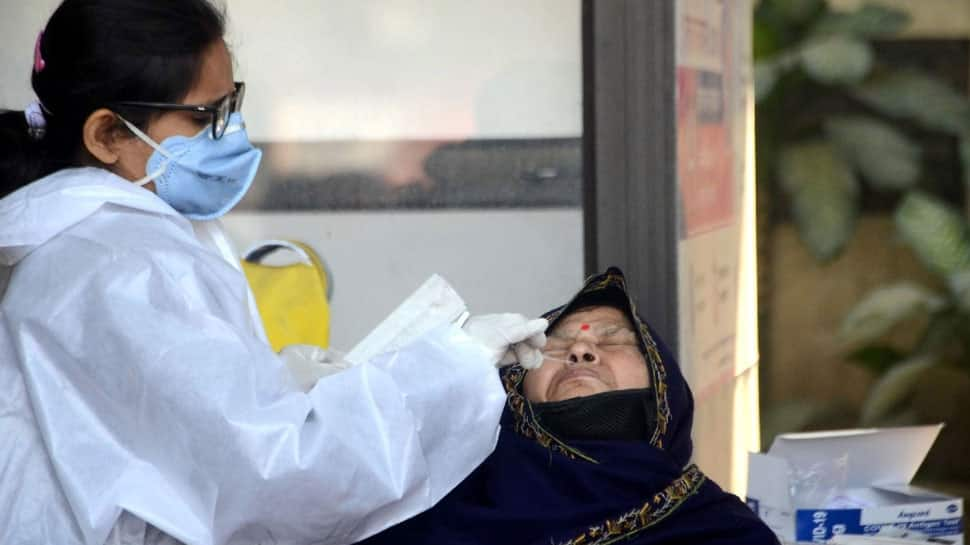Black Fungus making India’s COVID battle complicated, Zee explains its signs, symptoms and treatment
‘Black Fungus’ or ‘mucormycosis’ is a rare fungal infection. It is caused by a fungus named mucor, which is found on wet surfaces. Cases of mucormycosis are rapidly rising among COVID-19 survivors, causing blindness or serious illness and even death in some cases, health officials have warned.
- ‘Black fungus’ is a rare fungal infection among COVID-19 patients
- This rare fungal infection is being referred to as ‘Black fungus’ or ‘mucormycosis’ in medical parlance
- It is caused by a fungus named mucor, which is found on wet surfaces
Trending Photos
) Image for representational use only
Image for representational use only NEW DELHI: As the country continues to fight the COVID-19 pandemic, the growing number of Black Fungus cases across the country has become a big cause of concern for the Narendra Modi government at the Centre.
The government has told doctors to look out for signs of mucormycosis or "black fungus" in COVID-19 patients as hospitals report a rise in cases of the rare but potentially fatal infection.
What is Black Fungus?
‘Black Fungus’ or ‘mucormycosis’ is a rare fungal infection. It is caused by a fungus named mucor, which is found on wet surfaces. Cases of mucormycosis are rapidly rising among COVID-19 survivors, causing blindness or serious illness and even death in some cases, health officials have warned.
How Black Fungus infects a COVID-19 patient
This disease is not new, but it is rising among COVID-19 patients in India because the excessive use of steroids elevates sugar levels and some medicines suppress the immunity of these patients leading to loss of vision and death in some cases. The Black Fungus infects a COVID-19 patient easily. If it reaches the brain, it can prove fatal, says Dr Tatyarao Lahane, who heads the Directorate of Medical Education and Research of the state government.

Who is more vulnerable to Black Fungus?
The `black fungus', is present in the environment, but those with suppressed immunity or co-morbidities are more vulnerable to its infection, according to the doctors. To a large extent, it is happening to people who have diabetes. It is very uncommon in those who are not diabetic.
What are the common symptoms of mucormycosis?
Symptoms of mucormycosis include pain and redness around the eyes and nose, fever, headache, coughing, shortness of breath, bloody vomits and altered mental status, the advisory stated.

How many countries have detected Black Fungus?
There have been cases reported in several other countries - including the UK, U.S., France, Austria, Brazil and Mexico, but the volume is much bigger in India," said David Denning, a professor at Britain`s Manchester University and an expert at the Global Action Fund for Fungal Infections (GAFFI) charity. "And one of the reasons is lots and lots of diabetes, and lots of poorly controlled diabetes."
Though there is no published national data on mucormycosis, states like Maharashtra and its capital Mumbai, and Gujarat have reported maximum cases.
How it can be treated?
This infection can be treated via intravenous (IV) medication or through surgery. A patient infected by Black Fungus generally needs a type of injection for 21 days. The basic cost of this injection is around Rs 9,000 per day. During the first phase of the COVID-19 pandemic, the fungal infection typically came to light a couple of weeks after patients were discharged, Dr Hetal Marfatia, professor and head of the ENT department at the government-run KEM hospital in Mumbai. Niti Aayog Member (Health) V K Paul had on Friday said that mucormycosis cases were being found in patients with COVID-19.
VK Paul said, "When a patient is on oxygen support, it should be ensured that water does not leak from the humidifier (to prevent the growth of the fungus)." He also called for "a rational usage" of steroids and medicines such as Tocilizumab to treat COVID-19 patients.

What does the ICMR advisory say?
The Indian Council of Medical Research (ICMR) said that doctors treating COVID-19 patients, diabetics and those with compromised immune systems should watch for early symptoms including sinus pain or nasal blockage on one side of the face, one-sided headache, swelling or numbness, toothache and loosening of teeth.
The disease, which can lead to blackening or discolouration over the nose, blurred or double vision, chest pain, breathing difficulties and coughing blood, is strongly linked to diabetes. And diabetes can in turn be exacerbated by steroids such as dexamethasone, used to treat severe COVID-19.
DO'S
* Control hyperglycemia
* Monitor blood glucose level post-COVID-19 discharge and also in diabetics
* Use steroid judiciously – correct timing, correct dose and duration
* Use clean, sterile water for humidifiers during oxygen therapy
* Use antibiotics/antifungals judiciously
DON’TS
* Do not miss warning signs and symptoms
* Do not consider all the cases with blocked nose as cases of bacterial sinusitis, particularly in the context of immunosuppression and/or COVID-19 patients on immunomodulators
* Do not hesitate to seek aggressive investigations, as appropriate (KOH staining & microscopy, culture, MALDITOF), for detecting fungal etiology
* Do not lose crucial time to initiate treatment for mucormycosis
Medical treatment includes installing peripherally inserted central catheter, maintaining adequate systemic hydration, infusion of normal saline intravenously before Amphotericin B infusion and anti-fungal therapy for at least six weeks besides monitoring the patient clinically with radio imaging for response and to detect disease progression, it said.
Stay informed on all the latest news, real-time breaking news updates, and follow all the important headlines in india news and world News on Zee News.
Live Tv







)
)
)
)
)
)
)
)
)
)
